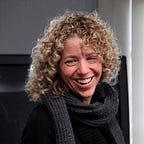The Art of (Self) Criticism
Toni Morrison passed away this month. And the last few weeks have seen an outpouring of appreciation for her towering contribution to American literature and the wider impact she made as a novelist.
I came across this quote of hers, from an interview she gave. Speaking about her craft, she said that to be a good writer you had to be a good reader — of your own work, specifically. And reading yourself meant also reading yourself critically:
“After all, this is my work. I have to take full responsibility for doing it right as well as doing it wrong. Doing it wrong isn’t bad, but doing it wrong and thinking you’ve done it right is.”
That last sentence echoed when I read it. It captured perfectly something of our cultural moment: a combustible mix of disinformation on the one hand, and an absolute conviction of the authority of one’s beliefs on the other.
Reading one’s own work, as Morrison did, means self-reflecting on one’s performance. And this kind of self-reflection is not for the faint of heart.
Have you ever watched yourself on video, listened to an audio recording of yourself? I know I have … and it’s hard not to cringe.
And yet, it’s important to do so to improve and gain competency at anything in life, whether it’s writing a novel or being a better friend. To read one’s own work, as a metaphor for critical self-reflection, requires strength, self-love, and endurance.
You need the strength to hold yourself, gently but firmly, at the edge of discomfort. You need self-love to be honest without being harsh. And you need endurance because it’s not a one-and-done solution. It’s a skill. And like any other skill, self-reflection takes practice to master.
But the payoff is immense. Because critical self-reflection, that is, giving yourself honest feedback about how you’re doing, is exactly what’s required to learn from our mistakes and grow as individuals.
But we’re not always taught to learn in this way. Instead, we’re often taught to get it right and to avoid mistakes which makes us frustrated at challenges, leading us to give up on, rather than lean in to, whatever feels difficult.
One result of this is a mindset that we are perfect just the way we are; if something doesn’t come easily then it must not be right, or worth doing in the first place. We become indignant and defensive and develop the tendency to view doubts as challenges and feedback as a threat to our self-esteem.
This holds just as true for self-reflection as it does for giving and getting feedback to and from others. Kim Scott, who wrote the book Radical Candor: Be a Kickass Boss Without Losing Your Humanity shows precisely how to use muscle and self-love in giving feedback:
Too kind and loving and you slip into “ruinous empathy”. Too direct and harsh without the right dose of love and care, and you’re simply practicing “obnoxious aggression”. To hit that sweet spot of “radical candor”, calls for being honest and direct but with care.
But one more ingredient is needed, and that’s “why”.
Why bother? Why engage in self-reflection, especially when it sometimes — or perhaps often — can be challenging and uncomfortable? What’s the point of wasting time on something that isn’t fun?
If you’re seeking a “why” for self-reflection, consider this story Viktor Frankl (another beautiful departed soul) tells in an old clip of him teaching students in 1972.
He describes his flight instructor’s navigation lesson on how to “crab” — to aim the plane north (i.e., higher) in order to arrive east, at your destination, because of cross currents.
In other words, he explains, you have to aim higher in order to meet your potential. We must expect more from ourselves in order to reach our goals, to be our best selves. The higher we reach, the higher we go.
But what if we need to learn something that lies beyond our knowledge? No amount of self-reflection will find knowledge if it’s not there to begin with.
Get a Coach
For instance, I struggle with numbers. As I grow my business, I have to grapple with new things constantly, and I find that I really struggle when it comes to numbers, finance, and forecasting.
And while sometimes improvement is a matter of self-reflection, sometimes it’s just a missing piece. We need to learn from someone else.
Obviously, in the case, of my business, or any business, we need other people — people skilled in the areas we’re not. But even within our own areas of expertise, we can hit a wall. We can stagnate. We just don’t see things outside our own range of vision. For that, we need a teacher, mentor, or coach.
Atul Gawande, one of my favorite thinkers and writers, is a skilled surgeon who in this TED talk and in this New Yorker article talks about his decision to hire a coach to become a better surgeon.
Why aren’t there coaches in every profession, he asks. Why just sports and leadership? Why not surgery? Why not teaching? In my case, why not finance?
“It’s not how good you are now,” Gawande says. “It’s how good you’re going to be that really matters.”
Learn more about leadership, learning, and development by visiting my blog.
Also be sure to join my monthly newsletter for insights, tips and stories related to the intelligent use of power in the workplace.
